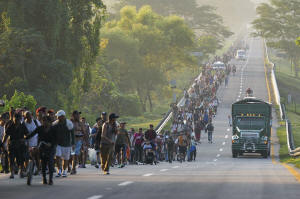Trump victory spurs worry among migrants abroad, but it's not expected
to halt migration
 Send a link to a friend
Send a link to a friend
 [November 08, 2024]
By MARÍA VERZA, FERNANDA PESCE and CHRISTOPHER SHERMAN [November 08, 2024]
By MARÍA VERZA, FERNANDA PESCE and CHRISTOPHER SHERMAN
MEXICO CITY (AP) — Donald Trump's victory in the United States
presidential election instantly changed calculations for millions of
migrants or potential migrants across the globe.
But perhaps not in the way Trump imagined.
Trump has pledged to reduce immigration. But by narrowing the already
limited legal pathways into the U.S., migrants will just recalibrate
their plans and resort in greater numbers to hiring smugglers, experts
say.
In many cases that will mean turning to organized crime groups that
increasingly profit from migrant smuggling.
Those potentially affected come from dozens of countries and many have
already sold their homes and their possessions to fund the trip.
Venezuelans continue arriving at the U.S. southern border in reduced,
but still large numbers. Mexicans made up half of U.S. Border Patrol
arrests in September. Chinese come through Ecuador and make their way up
through the Americas. Senegalese buy multi-stop flights to Nicaragua,
then move north.
The U.N.’s International Organization for Migration estimates there are
around 281 million international migrants in the world, or 3.6% of the
global population. An increasing number of people will be displaced for
political, economic and violence reasons, and more migrants will seek
asylum, according to its annual report. It warns that when people cannot
find regular pathways, they start looking for “irregular channels that
are extremely hazardous.”
During Trump's first administration, Mexican border cities were
saturated with migrants. Cartels preyed on them, kidnapping them,
extorting their families for ransoms and forcibly recruiting them into
their ranks. There were hundreds of arrivals every day, as well as
thousands who were made to wait out the potentially yearslong U.S.
asylum application process in Mexico.

A U.S. program called CBP One brought some order after it was introduced
by the Biden administration in early 2023. Migrants no longer have to
come to the border to schedule an appointment and can do it on their
smartphones. Once overflowing border shelters have emptied and many
families are making every effort to go the legal route.
Trump has pledged to end CBP One. He also wants to again restrict
refugee resettlement and warned throughout his campaign of mass
deportations.
While his victory was deflating and worrisome to those en route to the
United States, it was not a deal-breaker.
On Tuesday night, Bárbara Rodríguez, a 33-year-old Venezuelan, should
have been sleeping after walking more than eight miles through southern
Mexico's tropical heat with some 2,500 others from at least a dozen
countries.
Instead, she was watching U.S. election results on her cellphone.
Back in Caracas, Rodríguez helped monitor a polling place for the
opposition during Venezuela's July election. After President Nicolas
Maduro claimed reelection, his supporters began to harass her family.
“Either my family’s lives were going to be at risk or I had to leave the
country,” she said. In September, she sold her house and left her three
children with her mother.
Now her plan of waiting for a CBP One appointment to request asylum at
the U.S. border has an expiration date.
“Plans changed. We have until Jan. 20," she said, referring to
inauguration day. She has not ruled out hiring a smuggler, she added.
Martha Bárcena, Mexico’s former U.S. ambassador during most of Trump’s
first administration, said migrants were the losers from his immigration
policies and that could happen again.
“Organized crime is the big beneficiary, because the income from illegal
human trafficking is already equal to or greater than the income from
drugs,” she said.
Estefanía Ramos of Guatemala woke up worried Wednesday in a Ciudad
Juarez shelter across from El Paso, Texas.

[to top of second column]
|

Migrants walk along the highway in Huixtla, southern Mexico, heading
toward the country's northern border and ultimately the United
States, Thursday, Nov. 7, 2024. (AP Photo/Moises Castillo)

“We’re trying to figure out what’s going to happen to us,” the
19-year-old said. “This wasn’t the plan.”
She and her husband left Guatemala after a gang threatened to harm
him and kidnap her, she said. They have been waiting for three
months for a CBP One appointment. Two months ago they had a baby
girl.
“If we can keep waiting for an appointment we will,” Ramos said,
adding that she doesn’t want to risk an illegal crossing with the
baby.
On Wednesday in Ciudad Juarez, a few dozen asylum seekers with
appointments waited patiently to be called across the international
bridge.
Gretchen Kuhner, director of IMUMI, a nongovernmental legal services
organization in Mexico, was in the southern Mexican city of Tuxtla
Gutierrez last week, where she found migrant families with young
children living in the streets waiting for CBP One appointments.
“They are getting their cellphones charged every day at some
makeshift place on the street so they can check their CBP One
appointments ... while they’re breastfeeding and sleeping in a tent
without any water,” she said.
"People who need protection are really trying to do it the right
way.”
Further restrictions on the already difficult process would leave
vulnerable populations with few options, said Mark Hetfield, CEO of
the U.S.-based refugee support organization HIAS.
“It would mean they have no place to go because there are many, many
countries in the hemisphere where there is effectively no asylum
system or where even if you could get asylum, you’re not necessarily
safe,” he said.
And then there's the specter of massive deportations. Trump made a
similar threat before and didn't deliver, but there's real concern.
Deportations to countries like Cuba and Venezuela could be
complicated by icy relations, though Venezuela’s Maduro issued a
conciliatory message congratulating Trump Wednesday. Advocates in
Haiti on Thursday demanded countries, including the U.S., halt
deportations because of the country's domestic crisis.
And no country stands to be more impacted than Mexico. There are
some 11 million Mexicans living in the U.S., about 5 million of whom
don’t have legal status. Mexicans sent home more than $63 billion in
remittances last year, mostly from the United States. Mass
deportations would shake the finances of millions of families and
the Mexican economy would struggle to absorb them.

Migrant advocates and shelter directors in Mexico said they've heard
of no government plans to deal with large numbers of deportees.
Mexican aid groups are “not in a position to receive that quantity
of people and let's be honest, it's civil society that carries on
its shoulders most of the humanitarian response toward those who are
deported or in transit,” said Rafael Velásquez García, Mexico
director for the International Rescue Committee.
Mexico needs to prepare itself for all manner of pressures coming
from a Trump administration, said Carlos Pérez Ricart, a professor
of international relations at Mexican public research center CIDE.
“What Mexico has to accept is that our country is going to be a
holding country for migrants, whether they want it or not,” he said.
“Trump is going to deport thousands, if not millions of people and
he's going to impede the flow of migrants.”
___
Pesce reported from Ciudad Juarez, Mexico. AP writer Juan Zamorano
contributed from Panama City.
All contents © copyright 2024 Associated Press. All rights reserved |